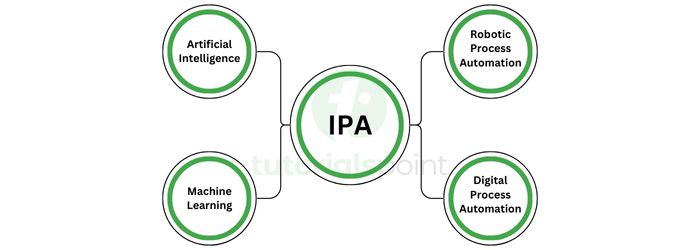
Intelligent Process Automation - Introduction
Intelligent Process Automation (IPA) is a modern technology used in business process automation and management to automate and streamline operations, enhance efficiency, minimize costs, and reduce manual execution of repetitive tasks. IPA basically combines robotic process automation (RPA) with cognitive technologies like artificial intelligence (AI) and machine learning (ML). Hence, IPA has capabilities to accumulate process data and learn from it to improve over time.
In this chapter, we will get familiar with the fundamentals of intelligent process automation, its key components and capabilities.
What is Intelligent Process Automation?
Intelligent Process Automation (IPA) is a business process automation technology that combines multiple advanced technologies such as artificial intelligence (AI), machine learning (ML), and digital process automation (DPA) with robotic process automation (RPA) to provide enhanced automation capabilities.
Hence, by making use of cognitive technologies, IPA can increase process performance, operational efficiency, and workflow management. IPA also reduces operational risks and creates an effective process automation environment within a business organization.
IPA is mainly designed to assist or free up human employees by automating routine, repetitive tasks and increase their productivity. Since IPA uses cognitive technologies, hence it can learn and improve from past data and experiences to perform processes more efficiently.
Due to all these advanced capabilities, business organizations use intelligent process automation (IPA) to automate most of their workflows and processes.
Components of Intelligent Process Automation
Intelligent Process Automation (IPA) uses multiple advanced technologies as its key components to provide automation of complex business processes. The main components that make up intelligent process automation are explained below −

Artificial Intelligence (AI)
AI is the most fundamental component of intelligent process automation, and it simulates human-like intelligence in digital systems. Thus, it provides cognitive decision-making capabilities to IPA systems.
As a part of intelligent process automation, AI performs the following key functions −
- Faster and accurate data analysis
- Identify patterns in process datasets
- Manage unstructured data and workflows
- Adapt to changes and optimize processes in real-time, etc.
Machine Learning (ML)
Machine learning is nothing but an AI-based technology that allows digital systems to learn from past data and experiences and improve over time without any explicit programming.
In intelligent process automation, ML acts as an important component because it allows automation systems to −
- Analyze historical data to identify patterns
- Perform predictive analytics and make more accurate decisions
- Improve efficiency and accuracy over time
- Be dynamic and adaptive, etc.
Robotic Process Automation (RPA)
Robotic process automation is a software-powered automation technology used as a component of IPA. In IPA systems, RPA is responsible for automating labor-intensive and time-consuming tasks such as data entry, invoice processing, etc. Thus, RPA provides capabilities to automate rule-based, repetitive tasks without human involvement.
Although, IPA combines RPA with AI and ML, enhancing its functional capabilities, and enables it to handle more complex processes and unstructured workflows.
Digital Process Automation (DPA)
Digital process automation is a software automation technology used to automate tasks and workflows, and optimize end-to-end processes. It provides functionalities to automate or partially-automate business processes, and enhance their efficiency and accuracy.
What is the Main Purpose of IPA?
Business organizations use intelligent process automation (IPA) as a key process automation tool with the aim to enhance their operational efficiency, process performance, reduced cost, and operational risks. The main purpose of intelligent process automation is to create an effective operations environment within a business organization.
Capabilities of Intelligent Process Automation
As IPA combines multiple advanced technologies like AI, ML, RPA, etc. Hence, it empowers business organizations with more innovative capabilities to optimize processes, streamline operations, and better decision-making.
Some of the important capabilities that intelligent process automation provides are listed below –
- It provides AI-powered, cognitive automation to assist human workers in making informed decisions and effectively completing tasks.
- IPA allows automation systems to understand human languages by using natural language processing.
- IPA allows organizations to enhance their consistency and agility in business processes.
- IPA also provides capabilities to discover processes, analyze data, and optimize business operations.
- IPA can extract data from documents and organize it into structured formats.
- IPA is also capable in processing visual digital formats like images or videos to extract information for process automation and optimization.
Importance of Intelligent Process Automation
In modern business organizations, intelligent process automation serves as an important technological tool because it allows to –
- Automate repetitive tasks and streamline operations
- Free up human workers to focus on high-value, strategic tasks
- Enhance customer support services
- Improves flexibility, etc.
Conclusion
In this chapter, we explained the basics of intelligent process automation (IPA) and its significance in business process automation and management. Let's move to the next chapter in the tutorial and learn the differences between IPA (Intelligent Process Automation) and RPA (Robotic Process Automation).